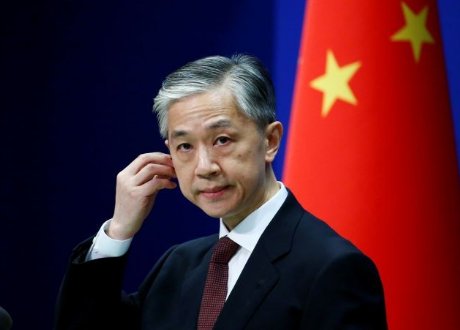Beijing: China said Wednesday that it was committed to maintain peace and stability along the Line of Actual Control (LAC) as it urged India to put the boundary issue at an ‘appropriate position’ and meet it ‘halfway’ for the long term development of the bilateral ties.
Chinese Foreign Ministry spokesman Wang Wenbin said this at his media briefing as he parried questions on India’s assertion that consensus reached by the leaders on maintaining peace along the border cannot be swept under the carpet.
Indian Ambassador to China Vikram Misri in his recent address to the India-China dialogue forum said that the significance of the consensus reached between leaders of the two countries to maintain peace along the LAC cannot be “swept under the carpet” and called for the complete disengagement of troops in Eastern Ladakh to rebuild bilateral ties strained by the “serious incidents”.
In a candid address to the ICWA (Indian Council of World Affairs)-CPIFA (Chinese People’s Institute of Foreign Affairs) virtual dialogue April 15, Misri also questioned the Chinese officials ignoring the “significant consensus” reached by the leaders of the two sides about the importance of maintaining peace along the LAC.
Asked for his reaction, Wang said that both sides held in-depth and candid talks on resolving the disengagement from the remaining areas of Eastern Ladakh after the withdrawal from Pangong Tso lake area.
Top Commanders of the two militaries held the 11th round of talks April 9 to disengage the troops from Hot Springs, Gogra and Depsang areas in Eastern Ladakh.
“On the issue of China-India boundary situation, China’s position is consistent and clear. We are committed to maintaining peace and stability in the border areas and we are firmly determined to safeguard our territorial sovereignty and security,” Wang said.
“Recently, the two sides have maintained communications through diplomatic and military channels. On the basis of disengagement in the Galwan Valley and the Pangong Tso regions, the two sides exchanged in depth and in a candid manner, opinions on resolving the remaining issue in the Western section of the boundary,” he said.
“We hope India will meet China halfway and will focus on the bigger picture of long term development of bilateral relations, put the boundary at an appropriate position and work to bring relations back to the track of steady and sound development,” he said.
To a follow-up question on Misri’s remarks, Wang reiterated that “we hope that India will meet China halfway and focus on the long-term development of bilateral relations, cherish the existing hard-won momentum for the de-escalation and take concrete measures to safeguard peace and tranquility along the border and work to bring bilateral relations back to the track of sound and steady development”.
Asked why China is not disengaging its troops from the remaining areas after the withdrawal from Pangong Tso, Wang said, “I would like to stress that recently, China and India through diplomatic and military channels maintained close communications”.
“On the basis of realising disengagement in the Galwan Valley and Pangong Tso, the two sides held candid and in-depth exchange of views on resolving remaining issues in the Western section of the boundary,” he said.
“We hope that the Indian side will abide by the agreements between the two militaries and consensus of the two sides and take concrete measures to safeguard peace and tranquility along the border,” he said.
In his address, Misri said the “sustainable solution” to the “present difficulties” in the Sino-India relations is “it must be one, as External Affairs Minister Dr. S Jaishankar has suggested, that is based on mutual sensitivity and respect and paves the way for maximizing our mutual interests”.
“The first is to note the importance of the two sides having maintained a sustained diplomatic and military dialogue in attempting to resolve issues. These discussions thus far have helped in achieving substantial disengagement of our forces,” he said.
“The second is to point out that senior leaders on both sides have committed and agreed that we must achieve complete disengagement in all friction areas. That would be an important first step towards considering de-escalation; it would also help in restoring peace and tranquility and, together, these would provide conditions for gradual and step-by-step progress in the bilateral relationship,” he said.
“This is also what would begin to restore trust and confidence in the relationship and help us rebuild the foundation of the relationship that was damaged through last year’s actions in Eastern Ladakh,” Misri had said.
PTI
